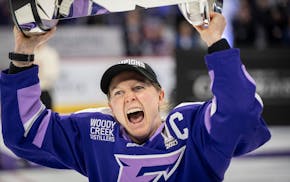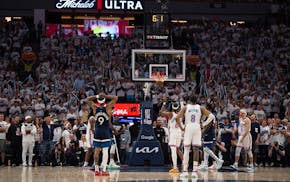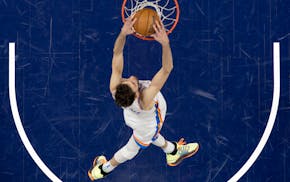There was a victory in Lakeville swimmer Regan Smith being in the Olympic final of the 200-meter backstroke at all.
Three years ago at the U.S. Olympic trials, attempting to qualify for the Tokyo Games in the event, Smith said, she hit rock bottom.
Nineteen years old and the world record holder, Smith had what she called the "scariest, most paralyzing race" of her career. She finished third. The 200 backstroke would not be part of her program in Japan.
"I felt like a scared zoo animal on display, with no escape," she said in an interview with the Star Tribune this spring. "I was choking on the water. It felt like a fight-or-flight situation. There was no fight in me at all. No motivation, no competitive drive."
The 200 backstroke was such a source of anxiety she dreaded swimming it. She was relieved not to have to do it in Tokyo on the international stage.
But on Friday at the Paris Olympics, there was Smith, in Lane 7, leading the 200 backstroke at the halfway point, still leading at the final turn.
In the end, Smith was reeled in and passed by her Australian rival Kaylee McKeown, collecting yet another silver medal. McKeown, who edged Smith in the 100 backstroke on Tuesday, is the first woman to sweep both backstroke events in consecutive Olympics.
And in the end, Smith said, "It feels really great."
McKeown, who took the world record from Smith last year, swam an Olympic record time of 2 minutes, 3.73 seconds, with Smith about half a second back in 2:04.26. Kylie Masse of Canada won bronze (2:05.57).
Smith earned her sixth career Olympic medal and her fifth silver, the third in Paris. She also finished second in the 200 butterfly on Thursday, saying she was no longer caught up in what color medal she won.
On Friday, she again focused on her plan, not where she finished.
"I think if I'd gotten a silver medal and been a second slower, I would have been really disappointed in myself," she told reporters. "That's one of my fastest times ever, and I really gave Kaylee a run for her money."
She said being in an outside lane, due to having the sixth-fastest semifinal time, helped her "not focus on what my competitors were doing."
"In the past I've really gotten lost and too concerned about what people around me are doing, rather than focusing on my own race plan," she added. "I especially do that in the 200 backstroke because of my history with it, so I think it was nice to have a little bit of outside smoke and put some pressure on things."
Her attitude toward the 200 backstroke changed under the tutelage of Michael Phelps' former coach Bob Bowman. Smith has said that leaving Stanford in 2022, turning pro and training with Bowman saved her life as well as her career. Through his rigorous workouts, Smith learned to enjoy the 200 backstroke again.
It was her last individual race of these Olympics. She swam a preliminary heat in the mixed medley relay earlier Friday and is expected to participate in the women's medley relay this weekend.
NBC swimming analyst Rowdy Gaines said before the Olympics that Smith was in the best shape of her life mentally and physically, but the "the unfortunate thing is she's facing maybe the two best all-around swimmers in the world" in McKeown and Canada's Summer McIntosh, who won the 200 butterfly.
Smith's father, Paul, predicted that she had a legitimate shot at three individual gold medals but could easily come away with zero. That proved prescient.
But after her final individual race Friday, Smith expressed joy.
"I made things close and exciting," she said. "I'm thrilled with it."
The Star Tribune did not send the writer of this article to the event. This was written using a broadcast, interviews and other material.
Star Tribune staff writers Rachel Blount and Rochelle Olson contributed reporting.

PWHL expansion to Seattle and Vancouver could shake up Frost's championship team

RandBall: 10 things to know about Minnesota sports today

Meet the best high school freshman athletes in Minnesota
![Anthony Edwards, Julius Randle and the Wolves were always a step behind the Thunder on Monday.
] CARLOS GONZALEZ • carlos.gonzalez@startribun](https://arc.stimg.co/startribunemedia/CJVGEXG7INGRNHAEH5TAVZQ24U.jpg?h=91&w=145&fit=crop&bg=999&crop=faces)
Podcast: Patrick Reusse on why he never thought the Wolves would win Game 4

